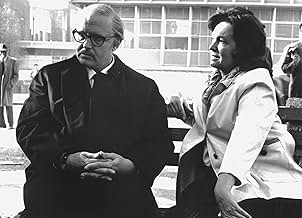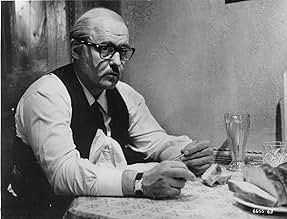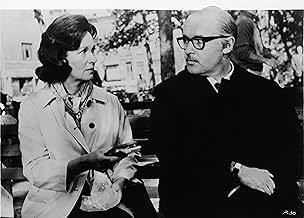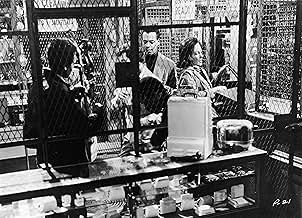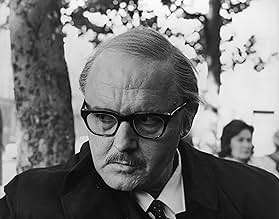Un prestamista judío, víctima de la persecución nazi, pierde toda fe en el prójimo hasta que se da cuenta demasiado tarde de la tragedia de sus actos.Un prestamista judío, víctima de la persecución nazi, pierde toda fe en el prójimo hasta que se da cuenta demasiado tarde de la tragedia de sus actos.Un prestamista judío, víctima de la persecución nazi, pierde toda fe en el prójimo hasta que se da cuenta demasiado tarde de la tragedia de sus actos.
- Dirección
- Guionistas
- Elenco
- Nominado a 1 premio Óscar
- 6 premios ganados y 10 nominaciones en total
- Jesus Ortiz
- (as Jaime Sanchez)
- Dirección
- Guionistas
- Todo el elenco y el equipo
- Producción, taquilla y más en IMDbPro
Opiniones destacadas
From start to finish The Pawnbroker is one tragic journey. Save for the optimistic Jesus the film is populated with characters in various forms of desperation. Rod Stieger as Nazerman is at times almost too painful to watch as he slips in and out of catatonia between the callous and cold diatribes he serves up to those attempting to reach out to him. Jaime Sanchez as Jesus is a bit too strident and Geraldine Fitzgerald's out of her depth social worker too clueless but Brock Peter's stylish thug is a potent dose of reality and highly effective.
Director Sidney Lumet's direction lapses into heavy handedness (slo mo, overlong flashbacks) on occasion bogging the film down while at other times "nouvelle vague" technique produces some powerfully edited scenes. Boris Kauffman's smoky cinematography successfully establishes mood and place stealing shots on Harlem streets and imprisoning Nazerman within the maze of cages in his shop and Quincy Jones quirky score partners nicely with the action and setting.
The Pawnbroker can be a difficult film to get through since the suffering remains unrelenting and Lumet's pacing is erratic most of the way but Stieger's towering performance makes it well worth the ordeal.
Rod Steiger as Sol Nazerman, the pawnbroker of the title is brilliant in the role. I doubt if there is anyone else who could have brought froth the depths of despair that Nazerman was experiencing. He lost everything, not just a family, but his who reason for living, and, as he says, there was nothing he could do about it. He was utterly helpless as his world crumbled.
He was a man without compassion or felling. His only comfort was money, and that really did him no good. It did not help him when he was reliving the flashbacks from the Holocaust. All he wanted to do was die, but apparently did not have the will to do it himself, so he set himself up for killing.
Steiger wasn't the only person that made this film worth watching. There was Brock Peters as a gangster, Thelma Oliver as the girlfriend of his assistant (Jaime Sánchez), and Sánchez himself.
The gritty and dark setting was perfect for the film. Sidney Lumet was excellent as the director.
I think there is something to be said for artists who invent and then convince everyone afterward that what they have just experienced is the way the world is put together.
Some filmmakers do this consistently. Or they do it once, and then just live in the world they've created. Others are amazingly clever at some point, and equally banal at others. Polanski comes to mind.
When this was new, it was groundbreaking, truly an achievement. It worked.
Lumet's approach is actor-centric, not something I particularly value. But it is perfect for an exploration of a man: world growing from an individual. Lumet also likes to use space, but he doesn't know the containment properties of space, only the dividers, so we have the shop will all sorts of walls and fences. The lover's apartment as well.
What was new was this was the first movie mainstream US movie to use nudity. Its underwhelming today thank heaven, but rather shocking in its day, especially because the woman is black, and a seller of sex.
In the project, it triggers the most extended flashback sequence, one that involved our hero's deepest disaster. Overlapping flashbacks had been used, most famously in "Manchurian Candidate," which resembles this in some ways. But it hadn't been so fragmented, so apparently integrated into the fabric of the man. We see a desperate whore; he sees his humiliated wife. We see street thugs beating up a drunk; he sees the holocaust.
This cinematic device is now so common as to not be remarkable. Sex (in the form of exposed breasts) and Nazis both had more cinematic power then than now.
Is it greater art if we digest it, even if the work itself becomes ordinary in the process? Seeing this will do to you what happens with the character we see. It will undress your memory, your cinematic memory. If you saw this when you were both young, it will give you a flashback, you living both now and then.
Ted's Evaluation -- 3 of 3: Worth watching.
¿Sabías que…?
- TriviaRichard Sylbert's set was deliberately designed to be a series of cages--wire meshes, bars, locks, alarms, etc.--to symbolize that even though Sol was no longer in a concentration camp, he was effectively still imprisoned by his memories.
- ErroresAs Jesus runs down the street, his shirt changes from a V-neck to a turtle neck, and then back again.
- Citas
Jesus Ortiz: Say, how come you people come to business so naturally?
Sol Nazerman: You people? Oh, let's see. Yeah. I see. I see, you... you want to learn the secret of our success, is that right? Alright I'll teach you. First of all you start off with a period of several thousand years, during which you have nothing to sustain you but a great bearded legend. Oh my friend you have no land to call your own, to grow food on or to hunt. You have nothing. You're never in one place long enough to have a geography or an army or a land myth. All you have is a little brain. A little brain and a great bearded legend to sustain you and convince you that you are special, even in poverty. But this little brain, that's the real key you see. With this little brain you go out and you buy a piece of cloth and you cut that cloth in two and you go and sell it for a penny more than you paid for it. Then you run right out and buy another piece of cloth, cut it into three pieces and sell it for three pennies profit. But, my friend, during that time you must never succumb to buying an extra piece of bread for the table or a toy for a child, no. You must immediately run out and get yourself a still larger piece cloth and so you repeat this process over and over and suddenly you discover something. You have no longer any desire, any temptation to dig into the Earth to grow food or to gaze at a limitless land and call it your own, no, no. You just go on and on and on repeating this process over the centuries over and over and suddenly you make a grand discovery. You have a mercantile heritage! You are a merchant. You are known as a usurer, a man with secret resources, a witch, a pawnbroker, a sheenie, a makie and a kike!
Jesus Ortiz: [long pause] You really some teacher, Mr. Nazerman. You really, really 's the greatest.
Selecciones populares
- How long is The Pawnbroker?Con tecnología de Alexa
Detalles
- Fecha de lanzamiento
- País de origen
- Idiomas
- También se conoce como
- The Pawnbroker
- Locaciones de filmación
- 1642 Park Avenue, Manhattan, Nueva York, Estados Unidos(Nazerman's pawn shop)
- Productoras
- Ver más créditos de la compañía en IMDbPro
Taquilla
- Presupuesto
- USD 930,000 (estimado)
- Total a nivel mundial
- USD 108
- Tiempo de ejecución1 hora 56 minutos
- Color
- Mezcla de sonido
- Relación de aspecto
- 1.85 : 1
Contribuir a esta página



